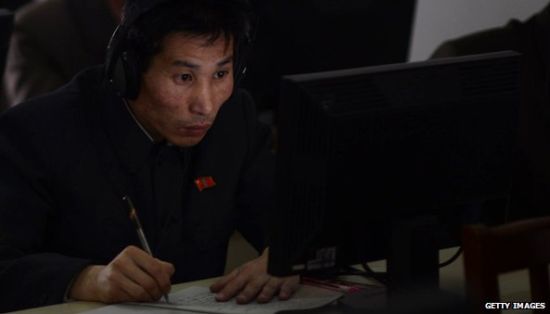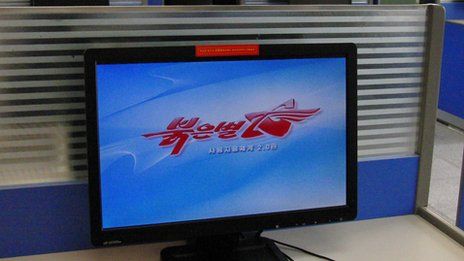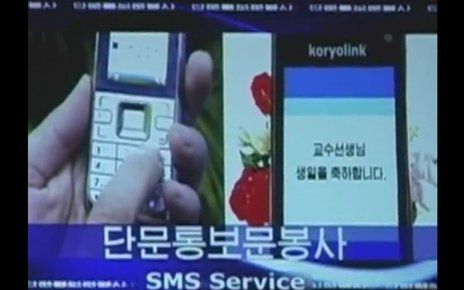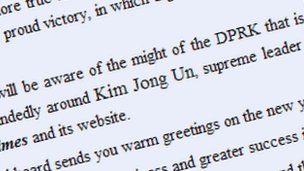在朝鲜上网:这个世界上最隐秘的国家网络
 1-只有被严格挑选过的社会“精英”才能够使用网络
1-只有被严格挑选过的社会“精英”才能够使用网络
 朝鲜的电脑运行的是特别开发的红星操作系统
朝鲜的电脑运行的是特别开发的红星操作系统
 朝鲜的手机提供3G频率,但是没有网络
朝鲜的手机提供3G频率,但是没有网络
 金正恩以及过去两位国家领导人的名字在朝鲜的网页中被稍微放大
金正恩以及过去两位国家领导人的名字在朝鲜的网页中被稍微放大
What is it like to surf the Internet in the most secretive country on Earth? The short answer is - strange, at least by the rest of the world's standards. But as North Koreans begin to put their lives at risk just to connect to the outside world, it could mark a dramatic moment in the country's history.在这个世界上最隐秘的国家上网会是什么样呢?简短的答案是:诡异的。至少以其他所有国家看来是这样。但是随着朝鲜人开始冒着生命危险试图取得与外界的联系,也许会为这个国家的历史创造出戏剧性的时刻。
There's a curious quirk on every official North Korean website. A piece of programming that must be included in each page's code。
Its function is straightforward but important. Whenever leader Kim Jong-un is mentioned, his name is automatically displayed ever so slightly bigger than the text around it. Not by much, but just enough to make it stand out。
It's just one facet of the "internet" in North Korea, a uniquely fascinating place。
In a country where citizens are intentionally starved of any information other than government propaganda, the internet too is dictated by the needs of the state - but there is an increasing belief that this control is beginning to wane。
"The government can no longer monitor all communications in the country, which it could do before," explains Scott Thomas Bruce, an expert on North Korea who has written extensively about the country。
"That is a very significant development."
Year 101
There's just one cybercafe in North Korea's capital, Pyongyang。
Anyone logging on at the cafe would find themselves at a computer that isn't running Windows, but instead Red Star - North Korea's own custom-built operating system, reportedly commissioned by the late Kim Jong-il himself。
A pre-installed readme file explains how important it is that the operating system correlates with the country's values。
The computer's calendar does not read 2012, but 101 - the number of years since the birth of Kim Il-sung, the country's former leader whose political theories define policy decisions。
Normal citizens do not get access to the "internet". That privilege is left to a select number in the country, known as elites, as well as some academics and scientists。
What they see is an internet that is so narrow and lacking in depth it resembles more an extravagant company intranet than the expansive global network those outside the country know it to be。
Continue reading the main story
USB balloons
According to Daily NK's Chris Green, one of the many innovative ways being used to get information into North Korea involves attaching USB memory sticks to balloons, and floating them across the border。
These sticks often contain South Korean programming - such as soap operas - and also the Korean language version of Wikipedia。
It means that while most North Koreans do not have access to the internet, they can still use these USB sticks to get information about the world beyond their border。
DailyNK is a website based in South Korea which publishes first-hand accounts of North Koreans both inside and outside the country。
"Time and time again we hear stories of which James Bond would be proud," said Mr Green in a recent presentation。
"Cellphones hidden in plastic bags and buried on hillsides far outside towns and cities, only being retrieved in order to make a single call, a call that must not last more than two minutes if the source is to avoid detection by the army of mobile electro-magnetic radiation detectors deployed by the Ministry of State Security."
"The system they've set up is one that they can control and tear down if necessary," explains Mr Bruce。
According to Mr Bruce, it consists mainly of "message boards, chat functions, and state sponsored media". Unsurprisingly, there's no sign of Twitter。
"For a lot of authoritarian governments who are looking at what is happening in the Middle East," says Mr Bruce, "they're saying rather than let in Facebook, and rather than let in Twitter, what if the government created a Facebook that we could monitor and control?"
The Red Star operating system runs an adapted version of the Firefox browser, named Naenara, a title it shares with the country's online portal, which also has an English version。
Typical sites include news services - such as the Voice of Korea - and the official organ of the state, the Rodong Sinmun。
But anyone producing content for this "internet" must be careful。
Reporters Without Borders - an organisation which monitors global press freedom - said some North Korean "journalists" had found themselves sent to "revolutionisation" camps, simply for a typo in their articles。
Beyond the Kwangmyong intranet, some North Koreans do have full, unfiltered internet access。
However, it is believed this is restricted to just a few dozen families - most directly related to Kim Jong-un himself。
'Mosquito net'
North Korea's reluctance to connect citizens to the web is counteracted by an acceptance that, as with trade, it needs to open itself up slightly if it is to continue to survive。
While China has its infamous "great firewall" - which blocks out the likes of Twitter and, from time to time the BBC website - North Korea's technology infrastructure is described as a "mosquito net", allowing only the bare essentials both in and out。
And it's with mobile that the mosquito net is most porous。
- 双语:10岁女孩自创《斗妈大全》蹿红网络2012-12-25 18:54
- 双语:看网络发展如何改变语言(图)2012-12-19 10:49
- 双语:英国父母担心网络“改装”儿童大脑2012-10-27 12:57
- 双语支招:六招让你成为社交网络“红人”(图)2012-04-23 10:03

